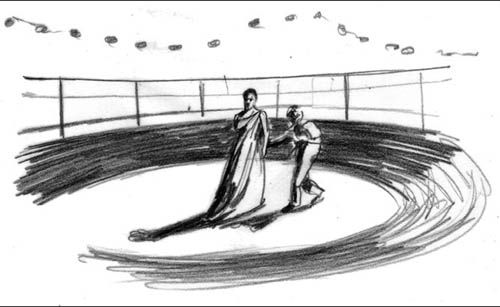Tragedy is a precious word. We use it to confer
dignity and value on violence, catastrophe, agony, and bereavement.
‘Tragedy’ claims that this death is exceptional. Yet these supposedly
special fatalities are
in our ears and eyes every day, on the roads,
in the skies, out there in foreign lands and right here at home, the
latest bad news.
Is the word now bandied around so freely that it has
lost all meaning?
Do our conceptions of tragedy have any real
connection with those of the ancient Greeks, with whom it originated two
and half thousand years ago as the description of a particular
kind of drama?
How did tragedy migrate from the Greeks to Shakespeare
and Racine, from drama to other art forms, from fiction
to real events?
Though its origins are shrouded in obscurity,
‘tragedy’ first emerged into the light in Athens around 533 bc with the
actor Thespis (from whom we get ‘thespian’= actor ). It
enjoyed a long high noon through the
following century, from which a handful of
masterpieces have survived in their entirety, seven attributed to
Aeschylus, seven to Sophocles and 19 to Euripides, the great trio
of playwrights.
Sophocles alone is said to have composed 130 – and it’s sobering
to realize what a small fraction has come down to us. The honour
of having their work performed at the Festival of the Great
Dionysia was restricted
to three dramatists selected to compete for the
prize of ‘best tragic poet’. Each had to supply three
tragedies and a satyr play, a grotesquely comic after-piece featuring a
chorus of satyrs
(half-man and half-beast), of which only one
complete example, the Cyclops of Euripides, has survived. There
were other competitions for comedy and dithyramb (a form
of choral song).
Special occasions, special people: tragedy
portrayed the fate of famous men and women – legends such as Oedipus
and Medea – in elevated style and language. The
word ‘tragedy’ seems to be derived from two Greek words, for ‘goat’
and ‘song’. Nobody quite knows why. Was the goat once a prize?
Later commentators thought the goat expressed a truth about the fall of great men, who look
good to begin with but end up badly. Just like a goat, said Francesco
da Buti in 1395, who has ‘a prince-like look in the front (horns and
beard) but a rear end that is filthy and naked’, and Giovanni da
Serravalle a few years
later, going one better: ‘for a goat has a
beautiful aspect, but when it passes it gives off a mighty stink from its
tailquarters’.
"We participate in tragedy. At comedy we
only look."
"I've never thought of my characters as
being sad. On the contrary, they are full of life.
They didn't choose tragedy. Tragedy chose
them."
Many people do not see the point to tragedy.
Much of American pop culture tends to embrace the comic vision of art, finding tragedy depressing
or disturbing. However, in the 5th century B.C.E., the classical Greek writers thought that facing
tragedy was a healthy and necessary antidote to human foolishness. It taught humans to know
themselves in a way comedy could not. The Greek philosopher Plato, quoting Socrates, admonished his
listeners, "Know thyself." Part of that is how we might react in a tragic situation similar to what the
protagonist faces.
"Tragedy is more important than love. Out
of all human events, it is tragedy alone that
brings people out of their own petty desires
and into awareness of other humans'
suffering. Tragedy occurs in human lives so
that we will learn to reach out and comfort
Likewise, the Romantic poets and later
Victorian viewers valued tragedy as an emotional exercise helping viewers learn compassion. Watching people
suffer on stage could help the audience sympathize with
another's pain. The rise of the sentimental
novel in the late 1700s and early 1800s reveals a cultural interest in this process, and Romantic poets
like Shelley, Byron, and Keats went into ecstasies over Shakespeare. Their poetic works are perhaps a
distant cousin to the great tragic dramas of earlier years.
"If a single person dies in front of you,
it is a tragedy. If a million people die on the
other side of the earth, it is a
statistic."
So what exactly counts as a literary tragedy?
What does not? Comedians jokingly refer to tragedy as "the
plays in which everybody dies." But the
genre is more complex than that. Many plays, movies, and stories contain death, violence, and unhappy
endings. Though depressing, these traits do not make a tragedy per se.
The classical definition comes from Aristotle:
"Tragedy is the imitation of an action
that is serious, complete, and of a certain
magnitude, in language embellished with each
kind of artistic ornament, the several
kinds being found in separate parts of the play
. . . through pity and fear effecting the
proper purgation of these emotions."
The word catharsis (translated as
"purgation") implies that tragedy purges, removes, or unclogs negative emotions such as pity and fear that
build up within the human spirit. Thus, watching a tragedy might be a sort of psychological Draino.
However, the word catharsis can also be translated as "purification," implying that somehow
tragedy purifies pity and fear, turns them into something healthy or good. Catharsis can also mean
"distillation," the sense that purifying something involves concentrating it into a more potent form. Somehow
tragedy takes all these negative emotions people feel and intensifies them. Depending upon how you
translate that single word, the purpose and definition of tragedy varies greatly.

The first component of tragedy is the tragic
hero. In traditional Greek drama, the hero must be somebody of great social importance--a prince
or ruler or hero far removed from the everyday Joe-onthe-street. The tragic
hero had to be someone basically likeable; he had to have traits that the
audience admired. Often, it is this same admirable trait that causes the hero's
downfall. For example, we admire Macbeth initially for his ambitious, go-get-'em
attitude. His up-and-at-'em philosophy takes Macbeth to glorious heights in the military. However, the
same trait causes his ethical and political self-destruction when he plots to kill his liege lord. In the
same way, we may admire the passion in Romeo and Juliet's young romance, but that same inability to live
apart results in their messy double-suicide. We admire Brutus for his patriotic concern for Rome, but
it is that same love of country that leads him into betraying his best friend. At some point, the
hero falls from glory. His own hubris, his own desire to reach beyond what is possible, ensures such a
fall.

Tragedy also involves a weird mixture of
personal choice and fate. To be a tragedy, the hero must have personal choice and agency. If a teenager is
shot at random in a drive-by shooting, his death does not count as a literary tragedy because the victim
did nothing to bring such misfortune upon himself. He had no choice in the matter. Such a death can only be
fashioned into tragedy if the subject makes some kind of
personal or moral decision. The decision (always made out of free will) then
results in a chain of unstoppable
and unforeseen negative events. That sudden shift from upward glory to tragic
decline is called
the peripetea. After the peripetea, the hero confronts social
forces so huge and irresistible the tragedy seems like the hand of fate.
Another important component of tragedy is anagnorisis. For the
tragedy to meet the bill, the
hero must realize
his mistake and its horrible results. If
a character never understands what occurred and why, the result may be brute suffering, but that does
not constitute tragedy in the literary sense.
Part of the pain a tragic
hero must face is his own realization of personal culpability and error.
However, that new insight always comes too late for him to change the
coming disaster. By the time Macbeth realizes his approaching downfall, he has become a hollow
shell of humanity, devoid of former ethics, and he cannot wash the blood from his hands. By the
time Brutus realizes the ultimate results of Caesar's assassination, Julius' adopted heir has already
claimed the imperial scepter and roused the mob against the assassins. Anagnorisis refers to the moment of tragic recognition,
in which the truth, especially a universal
or transcendent Truth-with-a-capital-T, reveals itself to the hero.
"What makes a tragedy so tragic is not
that the noble individual falls into ruin, but that
his fall causes so much suffering in
others."
Finally, tragedy spirals out behind the hero
himself. Not only does he suffer, his choice inflicts misery upon other innocent people, and he knows it.
The error may be King Lear's, but Cordelia is the one hanged. Romeo and Juliet made the choice, but
Tibalt and Mercutio also die. Tragedy is when a noble individual's poor choice destroys that
admirable individual and also causes suffering, pain, and death to others he holds dear.
The interest lies in how
the hero reacts to this knowledge. How does he respond to the no-win situation resulting from his earlier
choices? Macbeth responds with nearly psychotic fatalism. Othello with grieving tears. Hamlet with long
overdue action.


















